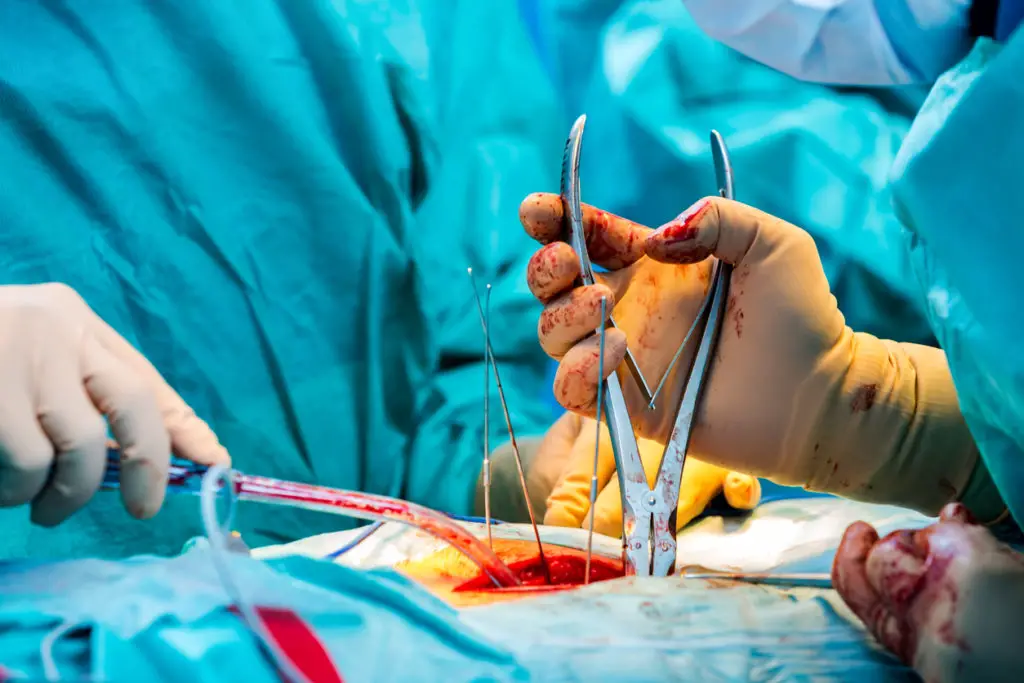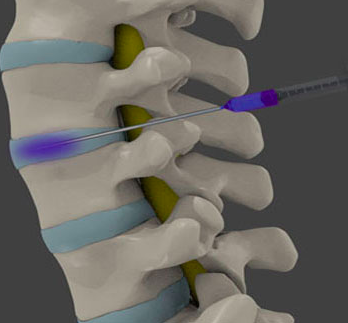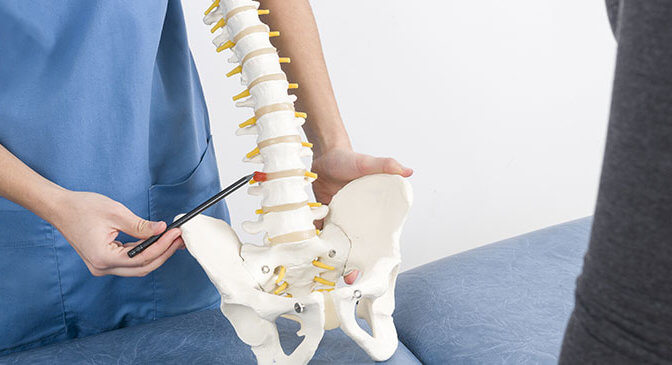Article reviewed and approved by Dr. Ibtissama Boukas, physician specializing in family medicine
“How long does a herniated disc ? This is a question that often comes up from my patients.
In other words, many would like to know the healing time for a herniated disc. Unfortunately, it is very difficult for me to give a precise prognosis, simply because the answer to this question depends on several factors. Admittedly, experience allows us to predict the evolution of certain patients, but this is not an exercise that I lend myself to regularly.
In the following article, I share with you the answer I offer to patients curious to know when their herniated disc will finally heal!
In a few lines, here is my answer:
“That's a legitimate question, dear Mr. (Ms.) Patient! On the other hand, know that your recovery depends on several factors. Some are unfortunately not editable, while others are. Let me introduce you to the 5 main factors that explain how long a herniated disc lasts. »
Note: Above all, it is essential that you familiarize yourself with the diagnosis of herniated disc. To know everything about this condition (symptoms, subtleties of diagnosis, treatment approaches), see the following article.
1. Type of back pain and herniated disc
Before discussing the link between your pain and the prognosis for healing your hernia, let's clarify a fundamental concept: The intensity of your symptoms is NOT necessarily proportional to the severity of the disc lesion at the lumbar level.
In other words, it doesn't mean that your disc has become more damaged if you ever feel more pain for a given period of time.
It has now been shown that many asymptomatic people (ie. having no daily low back pain) nevertheless present herniated discs and/or others degenerative changes withmedical imaging.
If we therefore refer to discopathies (problems with the intervertebral discs), we can thus conclude that these are not all the herniated discs which are problematic in themselves (or which require infiltration or an surgery). The same goes for other diagnoses such as narrow lumbar canal, spondylolisthesis, Or the scoliosis.
On the other hand, there are situations where the herniated disc (or other diagnostics) IS responsible for your pain. I know, it can be confusing…after all, we know that a traumatic fracture inevitably induces pain, and that the fracture line observed on the x-ray is responsible for our symptoms.
Unfortunately, this is far from the case with herniated discs and other back problems.
How then can we differentiate between symptomatic lesions and normal changes? Often, it is suspected that if damage to the intervertebral disc irritates surrounding structures (such as the nerve sciatica ou crural nerve, for example), the consequent inflammatory process will then be responsible for our pain.
Another theory states that if the disc injury happened quickly (either by trauma, or without giving the body the opportunity to adapt), then the disc disease will be symptomatic.
Anyway, a health professional qualified will be able to interpret your symptoms and relate them to a potential herniated disc. This is done through clinical tests and medical imaging exams (lumbar scan, Lumbar MRI, etc.) if necessary.
Once the observed disc herniation is judged to be symptomatic, then one can suspect that its size and/or type will influence healing time.
Indeed, it is not uncommon to see large herniated L4-L5 discs of the sequestration type compressing the L4 nerve root causing significant pain and a limitation of daily activities.
En sum, make sure that the diagnosis you were given is really responsible for the symptoms experienced. Then, refer to a health professional to determine the prognosis related to this particular impairment.
2. Duration of symptoms
I regularly see patients panicking after being diagnosed with a herniated disc, even more so when the symptoms don't seem to subside over time. It is the same when we have taken a drug, and that we observe no change in the level of pain!
For those who didn't already know: Any type of low back pain that is of recent onset is not necessarily serious. No need to worry, as healing is likely taking its course at this point.
Fortunately, almost 90% of low back pain heals in less than a month.¹. When the pain persists and does not seem to heal after 3 to 6 months, we then speak of Chronic Pain.
Hopefully these encouraging statistics put your mind at ease!
Obviously, all is not always rosy. Some herniated discs cause pain that becomes chronic, that is to say that persists over time. And the longer the pain persists, the harder it is to treat!
I often tell my clients that if the pain didn't come on overnight, it won't go away either!
Basically, chronic back pain caused by a disc problem is often "crystallized" at the level of the central nervous system, which makes it more difficult to treat.
Yes yes ! Even if the herniated disc at the lumbar level is minimal, your brain may react by "exaggerating" the protective message of pain. This can even lead to excessive muscle tension, irradiations similar to sciatica, or tingling and numbness.
3. Radiation of pain
Where are your symptoms located? Are the pains localized only in the lower back, or rather on one side (right or left)? And above all, do they radiate into one of your legs (of the type sciatica ou cruralgia)?
If so, it is important to determine if they radiate only to the buttock, or if they go down to the knee or ankle instead.
Now, let's explain how the location of pain is important, and can affect how long a herniated disc takes to heal.
Generally speaking, pain that is more localized in the lower back region has a better prognosis (ie it is normally easier to treat, and heals faster).
As to pain that radiates down the leg, it is generally said that the lower these descend in the leg (for example to the toes, unlike radiation to the buttocks only), the less favorable the prognosis.
Note that the Mckenzie method, a treatment technique regularly used in kinesitherapy (physiotherapy), seeks to identify directions of movement to reduce pain radiation, and promote healing of your back.
4. Psychosocial factors
When we have a herniated disc, we often think that the cause relates only to our vertebrae, muscles, ligaments, joints or intervertebral discs. But we must not forget that pain is a signal coming from the brain.
In several cases, for example if one touches a pot that is too hot, the pain is very useful because it prevents the body tissues from further injury. As mentioned previously, our brain may “exaggerate” the sensation of pain felt when it perceives an omnipresent threat…and this, even if the threat is not real!!!
Think about it: have you ever heard your alarm system going off at home while you were peacefully cooking? In this case, your alarm system detected a potential danger (fire!) while you were in control of the situation (not real threat!).
In the same way, the brain (your alarm system) can send a message of pain to your back even if your condition is not aggravated, and your bodily tissues are not damaged. But why?!
The answer is complex and beyond the scope of this article. Remember this: Pain is multifactorial and has a significant emotional component. The separation of physical and psychological to explain low back pain and herniated discs is a mistake that many clients - and even some therapists - make.
Let's clarify a few concepts here before continuing: It is very important to understand that your pain is REAL. I say this because many people with back problems do not feel understood. When I explain the concept ofbrain hypersensitivity, some clients take it as an insult and think I assume their pain is “only in their head”!
In reality, there is most likely a mechanical component to your low back pain. I am only saying that psychosocial factors have a ROLE to play in your pain (and even more if they are chronic)! By focusing only on the back and the mechanical factors, we can miss a significant part of the problem. This is the reason why we must not neglect our state of mind, as well as our emotions.
Did you know that negative thoughts such as fear, anxiety or catastrophizing are strongly correlated with pain and disability? For example, remember a stressful situation at work that you experienced lately: I guarantee that you felt your back more tense or painful in the days that followed.
In short, it is essential to consider these psychosocial factors in the management of back pain, especially since they are largely responsible for the healing time for many people!
5. Physical activity level
The benefits of physical exercise no longer need to be demonstrated. Moreover, many studies establish links between a sedentary lifestyle, back pain and herniated discs.¹. Similarly, certain prolonged postures (such as office work) can be a prelude to back problems (hence the importance of regularly straighten your back!).
With this in mind, it is easy to conceive that a sedentary individual will take longer to heal from his hernia. On the contrary, here is the good news of the day: a generally active individual will see his pain disappear more quickly!
Another factor to consider is the kinesiophobia, that is to say the fear of movement. Even normally active people sometimes avoid moving after an episode of herniated disc, and rest their back hoping that it will reduce their pain. NOPE! Unfortunately, as the muscles weaken and the back becomes stiffer, the opposite is most often observed in the long term.
Thus, the level of physical activity is linked to the prognosis of recovery, and the solution remains to adopt a proactive attitude at all times.
Herniated disc: Why not operate? (5 reasons)
Back pain, especially when it becomes chronic, can be debilitating. For example, many give up…
Nucleolysis: A solution to herniated disc? (risks)
Article reviewed and approved by Dr. Ibtissama Boukas, doctor specializing in family medicine What is…
Disc extrusion: What is it, and what to do?
Article reviewed and approved by Dr. Ibtissama Boukas, doctor specializing in family medicine What is…
Herniated Disc: Exercises to Avoid (and Other Common Mistakes)
Article reviewed and approved by Dr. Ibtissama Boukas, doctor specializing in family medicine If…
Herniated disc and sport: do they go together?
Article reviewed and approved by Dr. Ibtissama Boukas, doctor specializing in family medicine This…
Herniated disc from A to Z: Our complete guide
Herniated discs come in different forms. L4-L5, L5-S1, multi-stage, associated with sciatica,…
Conclusion: How long does a herniated disc last?
So! When asked how long a herniated disc lasts, I hope you now understand that the answer depends on several factors, the most important of which are mentioned in this article.
I would like to emphasize that the last two factors presented (the psychosocial factors and the level of physical activity) are modifiable factors. This means that you have a role to play in modifying these factors, and are thus able to shorten the healing time of your herniated disc.
There are several strategies for optimizing one's state of mind (among others, meditation and breathing). Likewise, I urge you to stay active despite the presence of back pain (obviously, in a safe and gradual way!). Also, I would like to point out that your condition, as chronic as it is, is not impossible to treat.
There is always something to do to get better. Don't lose hope, and keep fighting. Health professionals are your allies in your recovery!
My name is Anas Boukas and I am a physiotherapist. My mission ? Helping people who are suffering before their pain worsens and becomes chronic. I am also of the opinion that an educated patient greatly increases their chances of recovery. This is why I created Healthforall Group, a network of medical sites, in association with several health professionals.
My journey:
Bachelor's and Master's degrees at the University of Montreal , Physiotherapist for CBI Health,
Physiotherapist for The International Physiotherapy Center







